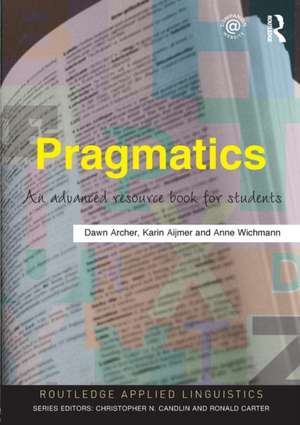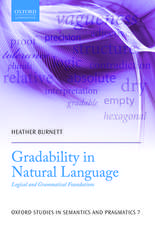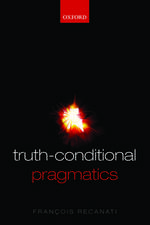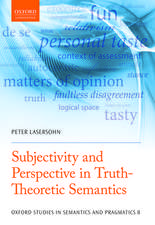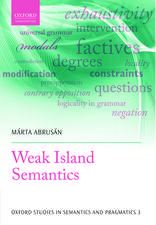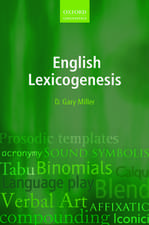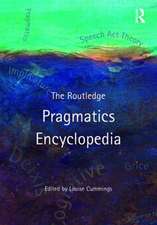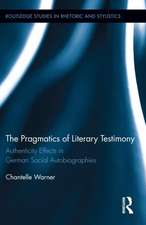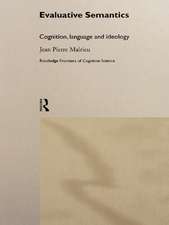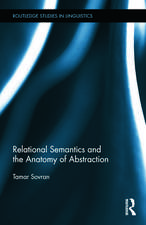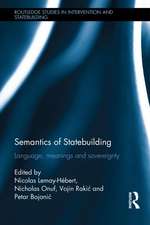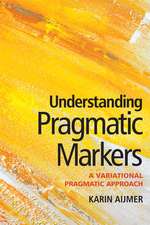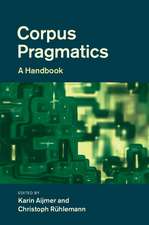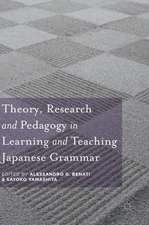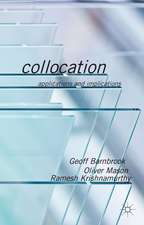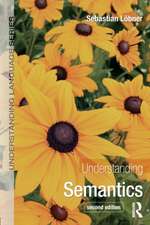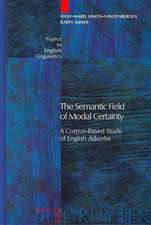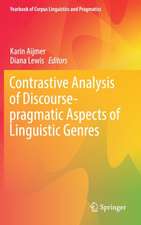Pragmatics: An Advanced Resource Book for Students: Routledge Applied Linguistics
Autor Dawn Archer, Karin Aijmer, Anne Wichmannen Limba Engleză Paperback – 11 apr 2012
Each book in the series guides readers through three main sections, enabling them to explore and develop major themes within the discipline.
- Section A: Introduction, establishes the key terms and concepts and extends readers’ techniques of analysis through practical application.
- Section B: Extension, brings together influential articles, sets them in context, and discusses their contribution to the field.
- Section C: Exploration, builds on knowledge gained in the first two sections, setting thoughtful tasks around further illustrative material. This enables readers to engage more actively with the subject matter and encourages them to develop their own research responses.
Pragmatics:
- provides a broad view of pragmatics from a range of perspectives, gathering readings from key names in the discipline, including Geoffrey Leech, Michael McCarthy, Thomas Kohnen, Joan Manes and Nessa Wolfson
- covers a wide variety of topics, including speech acts, pragmatic markers, implicature, research methods in pragmatics, facework and politeness, and prosody
- examines the social and cultural contexts in which pragmatics occurs, such as in cross-cultural pragmatics (silence, indirectness, forms of address, cultural scripts) and pragmatics and power (the courtroom, police interaction, political interviews and doctor-patient communication)
- uses a wide range of corpora to provide both illustrative examples and exploratory tasks
- is supported by a companion website at www.routledge.com/cw/archer featuring extra activities and additional data for analysis, guidance on undertaking corpus analysis and research, including how to create your own corpus with CMC, and suggestions for further reading.
| Toate formatele și edițiile | Preț | Express |
|---|---|---|
| Paperback (1) | 494.70 lei 6-8 săpt. | |
| Taylor & Francis – 11 apr 2012 | 494.70 lei 6-8 săpt. | |
| Hardback (1) | 1010.26 lei 6-8 săpt. | |
| Taylor & Francis – 12 apr 2012 | 1010.26 lei 6-8 săpt. |
Preț: 494.70 lei
Nou
Puncte Express: 742
Preț estimativ în valută:
94.66€ • 98.83$ • 78.34£
94.66€ • 98.83$ • 78.34£
Carte tipărită la comandă
Livrare economică 05-19 aprilie
Preluare comenzi: 021 569.72.76
Specificații
ISBN-13: 9780415497879
ISBN-10: 0415497876
Pagini: 350
Ilustrații: 13 black & white tables
Dimensiuni: 174 x 246 x 19 mm
Greutate: 0.58 kg
Ediția:New.
Editura: Taylor & Francis
Colecția Routledge
Seria Routledge Applied Linguistics
Locul publicării:Oxford, United Kingdom
ISBN-10: 0415497876
Pagini: 350
Ilustrații: 13 black & white tables
Dimensiuni: 174 x 246 x 19 mm
Greutate: 0.58 kg
Ediția:New.
Editura: Taylor & Francis
Colecția Routledge
Seria Routledge Applied Linguistics
Locul publicării:Oxford, United Kingdom
Public țintă
Postgraduate and UndergraduateCuprins
Section A: Introduction A1. The Origins of Pragmatics A2. Research Methods in Pragmatics A3. The Semantic-Pragmatic Interface A4. Speech Acts: Doing Things With Words A5. Implicature A6. Pragmatics and discourse A7. Pragmatic Markers A8. Pragmatics, Facework and Im/Politeness A9. Pragmatics, Prosody and Gesture A10. Cross-cultural pragmatics A11. Historical Pragmatics A12. Pragmatics and Power Section B: Extension B1. The Origins of Pragmatics. Readings: B Nerlich ,History of Pragmatics (2010). G. Leech, Principles of pragmatics (1983). B2. Research Methods in Pragmatics. Readings: G Kasper, Data collection in pragmatics research (2000). J.- van der Henst and D Sperber, Testing the cognitive and communicative principles of relevance (2004) T. Kohnen, Historical corpus pragmatics (2009) B3. The Semantic-Pragmatic Interface. Readings: K.M Jasczolt, Semantics-pragmatics interface (2010). R. Stalnaker, Pragmatic presuppositions (1974). N. J. Enfield, The definition of what d’you-call-it: semantics and pragmatics of recognitional deixis (2003) B4. Speech Acts: Doing Things With Words Readings: J. Manes and N. Wolfson ,The compliment formula (1981). A Jucker, Speech act research between armchair, field and laboratory. The case of compliments. (2009). M. Eisenstein and J. Bodman, Expressing gratitude in American English (1993) B5. Implicature Readings H.P. Grice, Logic and conversation (1989). G. Leech, Semantics: the study of meaning (1981). D. Wilson, Relevance Theory (2010). B6. Pragmatics and the Structure of discourse Readings: A. Tsui, English conversation (1994). M. Stubbs, Discourse analysis (1983). M. McCarthy, Talking back: "small" interactional response tokens in everyday conversation (2003) B7. Pragmatic Markers Readings: G. Diani, The discourse functions of I don’t know in English conversation (2004). G. Gilquin, Hesitation markers among EFL learners: pragmatic deficiency or difference? (2008). C. Ruhlemann, Conversation in context. A corpus-drive approach (2007). B8. Pragmatics, Facework and (im)politeness Readings: J. O’Driscoll, Brown and Levinson’s face- how it can and can’t help us to understand interaction across cultures (2007). R. Watts, Politeness (2003). J Culpeper, D. Bousfield and A. Wichmann, Impoliteness revisited: with special reference to dynamic and prosodic aspects (2003). B9. Prosody: Intonation Readings: I. Mennen, Phonological and phonetic influences in non-native intonation (2007). A Wichmann, The intonation of please-requests: a corpus based study (2004). C Gussenhoven, The phonology of tone and intonation (2004). B10. Cross-Cultural Communication Readings: A. Wierzbicka, Cross-cultural pragmatics (2003). J. Thomas, Cross-cultural pragmatic failure (1983). M Argyl, Bodily communication (1988) B11. Historical Pragmatics Readings: J. Culpeper, Historical pragmatics (2010). T. Kohnen, Historical corpus pragmatics (2009). I. Taavitsainen and A.H. Jucker, Methinks you seem more beautiful than ever (2008). B12. Analysing Power Readings: T. Van Dijk, Discourse, context and cognition (2006). S. Harris, Pragmatics and power (1995). K. Haworth, The dynamics of power and resistance in police interview discourse (2006). Section C: Exploration C1. Choosing, Transcribing and Annotating a Dataset C2. Exploring Routinised Speech Acts Using Corpora C3. Testing for Implicatures C4. The Organization of Discourse Structure C5. Pragmatic Markers: Further Explorations C6. Facework and Im/Politeness C7. Prosody and Non-Verbal communication C8. Cross-Cultural and Intercultural Pragmatics C9. Power. References
Recenzii
'Pragmatics is a field of linguistics that has developed and diversified so immensely over the past thirty years, that it can easily make the student feel confused as well as fascinated. Pragmatics: An advanced resource book for students is an excellent answer to this problem – a rich tapestry of discussion, textual materials, and thought-provoking tasks, rendering pragmatic concepts and methods accessible both to the beginner and the advanced student. It is highly readable yet deeply informative, containing discussion of a wealth of stimulating and well-chosen textual examples. It introduces a wide range of approaches and key contributions to pragmatics with admirable clarity and even-handedness. It will undoubtedly prove a resource of lasting value and can be unreservedly recommended.' Geoffrey Leech, University of Lancaster, UK
'This is an unusually rich textbook, which provides a wealth of resources for the study of the vast field of pragmatics. It includes some of the classics in the field as well as recent cutting-edge research in the various new subfields of pragmatics, such as politeness research, cross-cultural and intercultural research, and the pragmatics of prosody and non-verbal communication, and it accompanies these with student-friendly introductions and contextualizations as well as eminently doable exercises and research projects.' Andreas H. Jucker, University of Zurich, Switzerland
'This book covers a wide range of topics, including the history and development of pragmatics, from issues which interested the speech act philosophers to an empirical area of study—how language is used in communication—with data from large corpora and experimental methods. The editors have managed to achieve a pedagogic structure of the book which makes it an ideal student text.' Jan Svartvik, Lund University, Sweden
'If a colleague, still active in teaching would ask me, as an emeritus, what I most regretted to have missed in my long teaching career, a serious candidate for an answer would be: Not to have had access to this eminent, and indeed practical, new textbook of pragmatics.
The book’s concept of having a tripartite division into Introduction, Extension, Exploration works very well in this case, where first, the thematic articles expound the theory in 'bite-size', accessible format; then, the relevant corresponding literature is grouped along the same dimensions as are the introductory pieces; the texts (often hard to locate) are gathered and commented on, analyzed, and finally offered up as a springboard for ulterior, independent work.
I would recommend anybody with an interest in pragmatics (even if he or she may currently not be teaching) to take this ‘walking tour’ of the field, under the savvy guidance of the three authors: Archer, Aijmer and Wichmann, who deserve to be commended for their success in bringing pragmatics to where it actually can be taught, without having to hew to particular or particularized opinions or ‘schools’. More generally, I found that the clear exposition, combined with a very practical approach (such as by devising features like ‘Summaries’ and ‘Looking Ahead’, added to each of the subsections), the clear and comprehensive, yet succinct coverage of many difficult subjects (such as ‘implicature’—easily among the best I’ve come across at this level), and its up-to-date coverage make this an ideal acquisition by any university library (and, who knows, nary a professor wanting to bone up on his or her pragmatics – or even that private bookworm still hiding out somewhere in the deeper reaches of the pragmatic universe). In a more general way, the work is eminently suited, in my judgment, as a textbook for university courses at the senior undergraduate or early graduate level.
The editors must be praised and thanked for putting together this true treasure trove of well-cross-referenced and intelligently selected contributions, along with a near-flawless bibliography.' Jacob L. Mey, University of Southern Denmark
'This is an unusually rich textbook, which provides a wealth of resources for the study of the vast field of pragmatics. It includes some of the classics in the field as well as recent cutting-edge research in the various new subfields of pragmatics, such as politeness research, cross-cultural and intercultural research, and the pragmatics of prosody and non-verbal communication, and it accompanies these with student-friendly introductions and contextualizations as well as eminently doable exercises and research projects.' Andreas H. Jucker, University of Zurich, Switzerland
'This book covers a wide range of topics, including the history and development of pragmatics, from issues which interested the speech act philosophers to an empirical area of study—how language is used in communication—with data from large corpora and experimental methods. The editors have managed to achieve a pedagogic structure of the book which makes it an ideal student text.' Jan Svartvik, Lund University, Sweden
'If a colleague, still active in teaching would ask me, as an emeritus, what I most regretted to have missed in my long teaching career, a serious candidate for an answer would be: Not to have had access to this eminent, and indeed practical, new textbook of pragmatics.
The book’s concept of having a tripartite division into Introduction, Extension, Exploration works very well in this case, where first, the thematic articles expound the theory in 'bite-size', accessible format; then, the relevant corresponding literature is grouped along the same dimensions as are the introductory pieces; the texts (often hard to locate) are gathered and commented on, analyzed, and finally offered up as a springboard for ulterior, independent work.
I would recommend anybody with an interest in pragmatics (even if he or she may currently not be teaching) to take this ‘walking tour’ of the field, under the savvy guidance of the three authors: Archer, Aijmer and Wichmann, who deserve to be commended for their success in bringing pragmatics to where it actually can be taught, without having to hew to particular or particularized opinions or ‘schools’. More generally, I found that the clear exposition, combined with a very practical approach (such as by devising features like ‘Summaries’ and ‘Looking Ahead’, added to each of the subsections), the clear and comprehensive, yet succinct coverage of many difficult subjects (such as ‘implicature’—easily among the best I’ve come across at this level), and its up-to-date coverage make this an ideal acquisition by any university library (and, who knows, nary a professor wanting to bone up on his or her pragmatics – or even that private bookworm still hiding out somewhere in the deeper reaches of the pragmatic universe). In a more general way, the work is eminently suited, in my judgment, as a textbook for university courses at the senior undergraduate or early graduate level.
The editors must be praised and thanked for putting together this true treasure trove of well-cross-referenced and intelligently selected contributions, along with a near-flawless bibliography.' Jacob L. Mey, University of Southern Denmark
Notă biografică
Dawn Archer, Karin Aijmer, Anne Wichmann
Descriere
Written by experienced teachers and researchers in the field, Pragmatics provides an essential resource for students and researchers of applied linguistics
